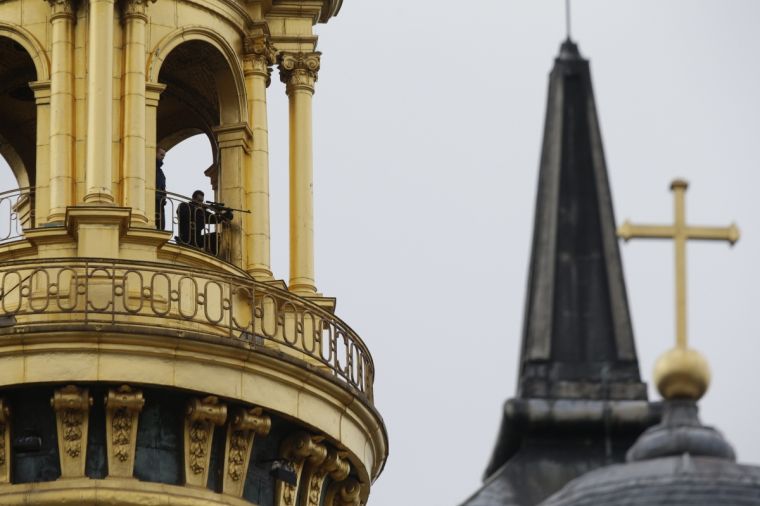How can we live peacefully in an age of terror?

In America you are more likely to be killed by a toddler than a terrorist.
Stop. Press.
Last year in the US more toddlers shot and killed people with guns than terrorists did. That's children under the age of three finding guns, playing around and shooting themselves, their friends or someone from their family with absolutely no idea of what they were doing.
It's a shocking and revealing horror story, which members of the anti-gun lobby in the US will no doubt despair over.
Yet, entire political campaigns are being built on the panic that terrorism might occur anywhere at anytime. The media is doing a brilliant job of whipping up a culture of fear which only feeds xenophobic politicians' campaigns to keep refugees and immigrants out. After all, do we really know who those people of a different colour, ethnicity or religion really are?
Still, America gets to keep the cute toddlers.
Generation Z (those born after 1996) have grown up in this new age of terrorism rhetoric, knowing little else. According to some statistics, 70 per cent of teenagers surveyed around the world are worried about terrorism even though the vast majority will never experience it. From 2001 to 2014 only 420 Europeans were killed in terrorist attacks. American teenagers, equally unlikely to ever come anywhere near a terrorist attack, would be more justified in being scared of their kid brother or sister who gets hold of Daddy's gun.
Someone living in Pakistan could be justified in feeling anxious on their daily commute, in their school or the local shopping mall. During those same years, 2001 to 2014, there were 13,524 deaths in Pakistan from terrorism, and recent events only serve as further evidence that the threat is a very real one.
A friend of mine, born in Pakistan, says that fear was part of her everyday existence when growing up. This became a terrifying reality when a suicide bomber attacked her parents' church during a service: "My parents and many others saw his body explode in the air, splashing blood all around and causing deaths and injuries of people next to him."
Although her parents survived, she says: "The wound of loss and trauma from that day is something not easily healed by time. The fear is always with you."
You can't control fear once it has been set loose. Often it seems to have little to do with how real the threat is. Who's really scared of a toddler, right? Even if you did leave your gun lying around.
My friend in Pakistan certainly had more reason to feel afraid than many teenagers surveyed, but that's only when you see fear as rational, which it is not. That's why it's such a powerful weapon of war. When coupled with the virtual world of terrorism which teenagers can access at anytime on their phones, often witnessing atrocities, beheadings and bomb blasts in their bedrooms, it's no wonder they have become so afraid.
Fear creeps in. You didn't even think you were a nervous person but the more you think about it, the more vulnerable you realise you are. Fear tightens its grip and before you know it, you're making decisions based on it.
I'll take the bus instead of the tube.
I'll sit next to this person not that person.
I'll invite this neighbour to my home but not that neighbour.
The news becomes increasingly addictive and the politicians' protective measures start to make sense.
Certainly we live in troubled times. More people have been forced out of their homes because of conflict and persecution than at any time since the Second World War. Horrific attacks in Paris, Brussels and around the world are indeed unnerving.
How are we to respond, then, in these changing times? How can we live peacefully in an age of terror? How can I control the fear that I, like many of those teenagers, frequently feel?
We're told in 1 John that perfect love drives out fear. But how can love, which often feels so pathetic in the face of these huge world events, make any kind of difference?
Pope Francis might have looked pathetic to some on Maundy Thursday, kneeling down before men and women so unlike himself. One of the world's most powerful religious men got on his knees to wash the feet of homeless and stateless refugees who are so often mocked, bullied and marginalised. In doing so, he made a striking statement about our inclusive God of love. Some wept as he gently bathed and kissed their feet: feet which had journeyed thousands of difficult, dangerous miles to seek refuge. He crossed cultural, religious, social, and even political divides, demonstrating what love and grace look like.
His radical act of love was a stark rejection of fear. It was nothing short of transformational.
If the media and politicians are happy to put fuel on the terrorist fire of fear, maybe it's down to us to ignite a culture of love which drives out insecurity, xenophobia and division. We might not be able to wash the feet of a refugee, but we can smile at someone who doesn't look like us or share a meal with someone from a different culture, or even talk to someone who has been caught up in conflict or war.
We can't control what will happen and when, yet tiny and sometimes radical acts can make love feel more tangible than our anxieties. As we determine to cross over and break down the walls which exist between us, love can drive out fear.











